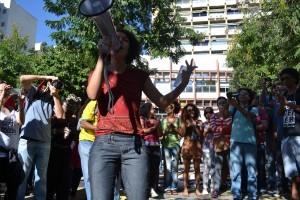EspañolThe day before the World Cup’s final game took place, 30 arrest warrants went out in Brazil. These left 19 activists arrested, and 16 individuals accompanying the detainees at the time, detained without a court order.

The head of the Civil Police of Rio de Janeiro, Fernando Veloso, confirmed that the detentions were carried out to stop the activists from mobilizing. He said his belief was that they intended to “incite violence” — although he presented no clear evidence that these people were preparing for or had plans to commit acts of violence.
The detentions were supposed to last five days. However, this kind of “provisional detention” may be renewed or treated as a “preventive detention.” That would leave the activists arrested indefinitely and thus far, three of the detainees have been informed that their detention period will be extended.
According to Amnesty International, there is no doubt that the police raid was not spontaneous. The organization alleges that these operations were part of “an intimidation pattern that was identified before the World Cup started.”
On Sunday, July 13, the day the World Cup final, 26,000 soldiers and police officers carried out a security operation around the Maracaná stadium. That same day, many police officers intercepted a protest held in “the same area located in the northern part of the city.”
According to a press release from the Institute of Human Rights Defenders, a Brazilian NGO that provides legal aid to prisoners, “journalists and lawyers were physically and verbally assaulted by the military police.” They report that military police retained the protesters for four hours in the place where the demonstration was taking place, beating and exposing them to teargas bombs.
On Tuesday, July 15, Judge Siro Darlan Oliveira issued a release order for 12 of the arrested activists. While the defense attorneys were communicating the court decision to the press, another protest broke out in front of the Court of Justice of Rio de Janeiro, “demanding the release of all the activists.”
Sources: El Ciudadano, Diario de Yucatán, W Radio.
 Versión Español
Versión Español












